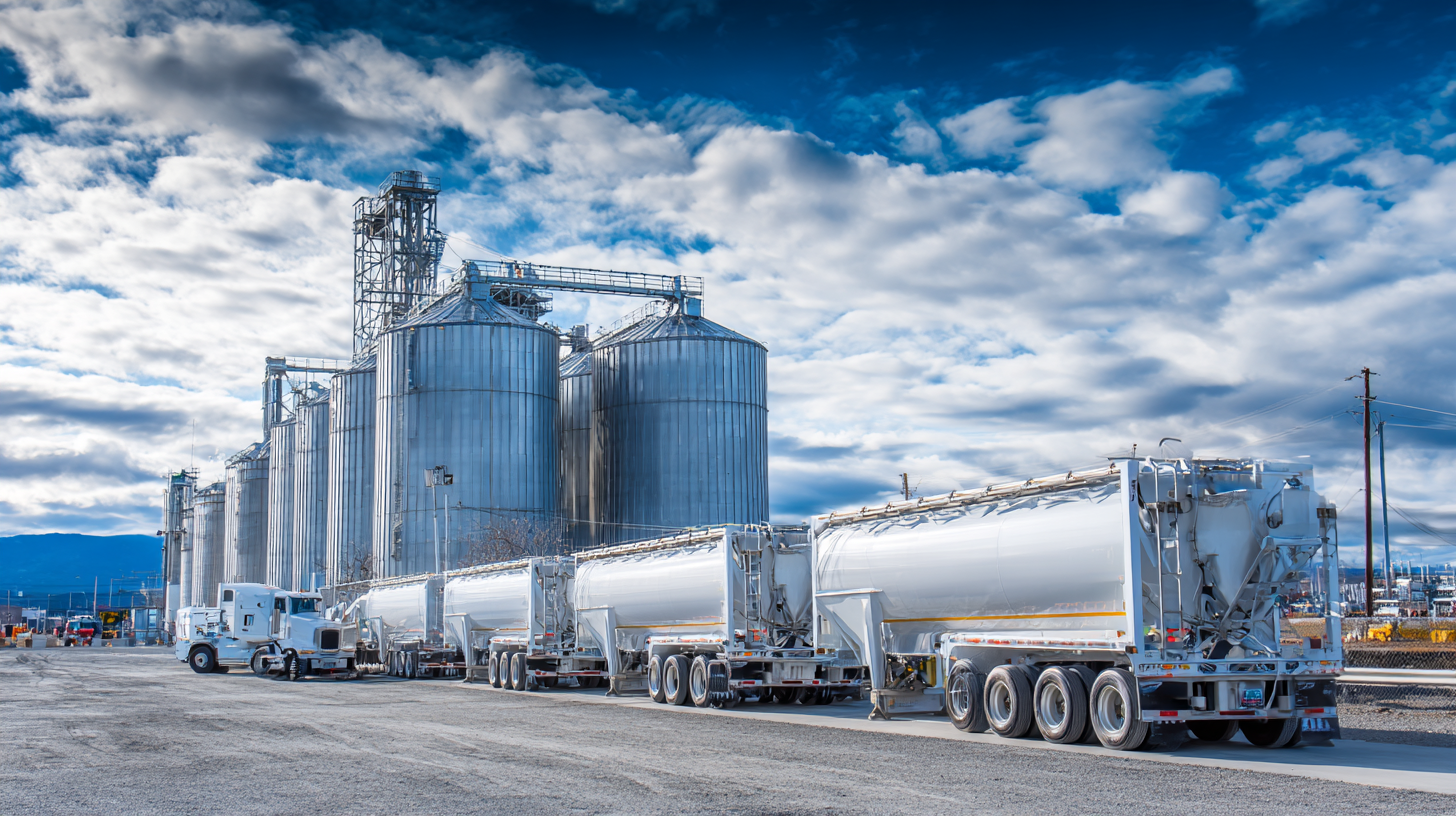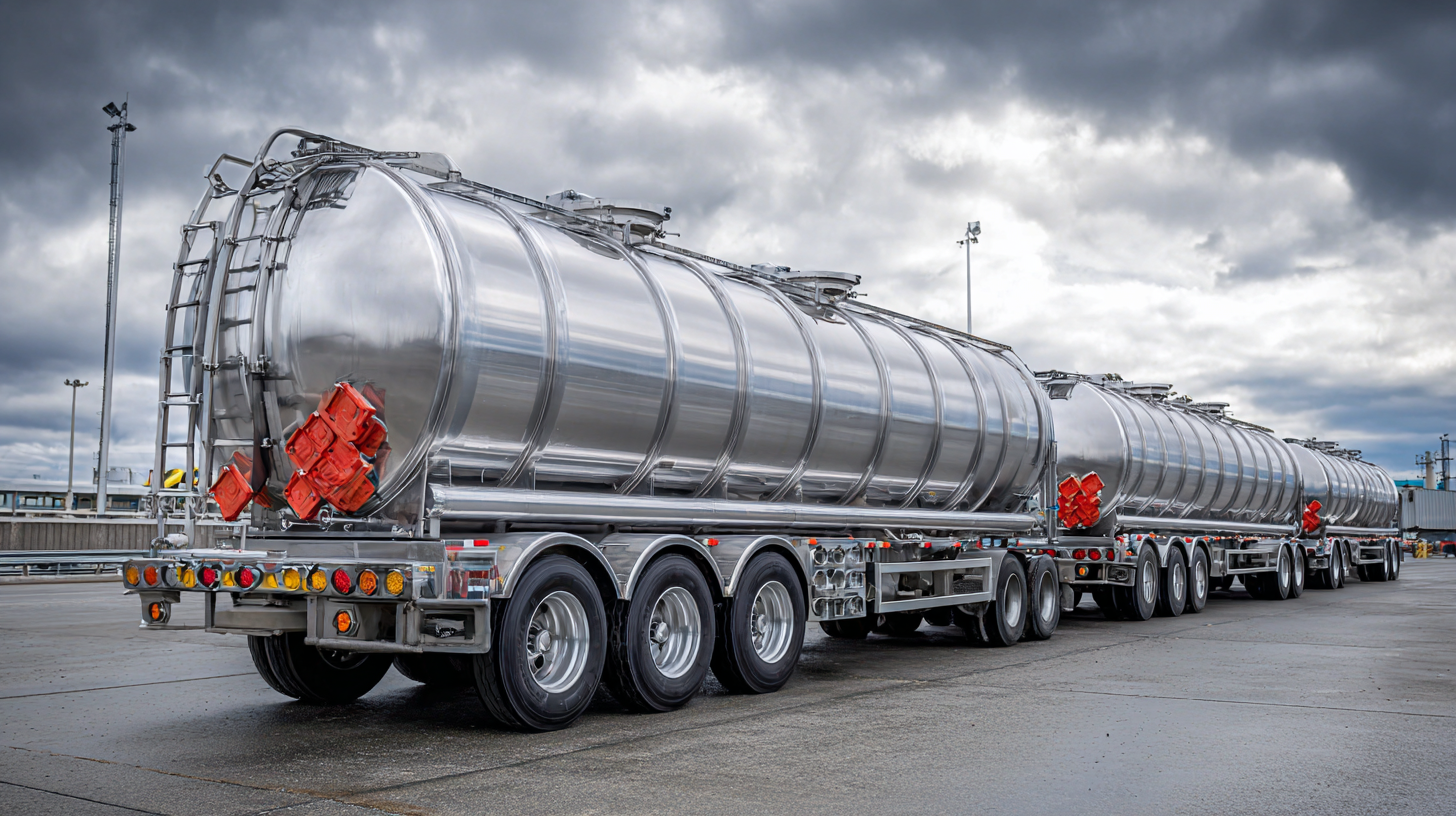- Home
- >
- Knowledge Center
- >
- Blogs
Blogs
Sharing knowledge is key to an innovative and healthy industry! This knowledge center is therefore a central place on our website to share information. Read all about our industry in the blogs below!
7 Reasons Why Best Dry Bulk Tanks Are Essential for Your Business Success
In today's competitive industrial landscape, the efficiency of material handling can significantly impact a business's bottom line, making Dry Bulk Tanks an essential investment for many operations. According to a report by the Global Bulk Tank Market Analysis, the demand for dry bulk storage solutions is expected to grow by 6.5% annually, driven by the rising need for safe, efficient transportation of granular materials across various sectors, including agriculture, construction, and chemicals. These tanks not only enhance logistical capabilities but also contribute to operational safety and environmental compliance, as highlighted by recent studies indicating that companies utilizing high-quality Dry Bulk Tanks experience a 20% reduction in spillage and material waste. As businesses strive for greater efficiency and sustainability, understanding the pivotal role that Dry Bulk Tanks play in facilitating these goals is more crucial than ever.

Importance of Choosing the Right Dry Bulk Tank for Operational Efficiency
When it comes to operational efficiency, selecting the right dry bulk tank can make a significant difference for businesses engaged in transporting and storing bulk materials. One of the first considerations is the tank's capacity and design, which should align with your specific product requirements. Different materials demand distinct features, such as corrosion resistance and thermal insulation, ensuring that the integrity of the product is maintained throughout the transportation process. A well-chosen dry bulk tank not only optimizes storage space but also minimizes the risk of contamination, leading to smoother operations and better product quality.
Moreover, the efficiency of logistics plays a crucial role in determining overall business success. The right tank can enhance loading and unloading processes, thereby reducing downtime and labor costs. Additionally, a high-quality dry bulk tank often features advanced dispensing systems that facilitate faster transfers, which can significantly streamline your workflow. By investing in the best dry bulk tanks tailored to your operational needs, you position your business for enhanced productivity and reliability in an increasingly competitive market.

How Dry Bulk Tanks Enhance Product Quality and Safety Standards
Dry bulk tanks play a crucial role in ensuring the quality and safety of products, particularly in industries like dairy. For instance, the journey of milk from the farm to processing plants heavily relies on the cleanliness and integrity of bulk tanks. Contamination from environmental microorganisms can occur at multiple stages, including milk collection and transportation.
 By utilizing high-quality dry bulk tanks, businesses can implement stringent hygiene protocols that significantly reduce the risk of microbial contamination during transit and storage. This is vital for maintaining the microbiological quality of dairy products, ultimately enhancing consumer safety and trust.
By utilizing high-quality dry bulk tanks, businesses can implement stringent hygiene protocols that significantly reduce the risk of microbial contamination during transit and storage. This is vital for maintaining the microbiological quality of dairy products, ultimately enhancing consumer safety and trust.
Moreover, advancements in tank cleaning methods, such as innovative processes for removing residues, underscore the importance of maintaining product safety standards. Regular and effective cleaning protocols not only prevent cross-contamination between different cargo types, but also ensure compliance with industry regulations. With heightened focus on food safety, businesses equipped with the best dry bulk tanks can ensure that they meet the stringent testing criteria for raw and processed dairy products. This not only boosts product quality but also fortifies a brand’s reputation in an increasingly competitive market.
Cost Savings Achieved through Modern Dry Bulk Tank Solutions
Investing in modern dry bulk tank solutions is crucial for businesses aiming to achieve significant cost savings. According to a recent report by MarketsandMarkets, the global dry bulk tank market is projected to grow from $1.5 billion in 2022 to $2.3 billion by 2026, driven by the increasing demand for efficient transportation and storage of bulk materials. By implementing advanced tank designs and materials, companies can reduce waste and enhance the overall efficiency of their logistics operations, translating to lower operational costs over time.
Moreover, adopting state-of-the-art dry bulk tank technologies not only minimizes the risk of spills and leaks but also optimizes storage capacity. A study by Grand View Research highlights that companies that utilize modern bulk handling equipment can see a reduction in downtime and an increase in productivity by as much as 30%. These advancements directly contribute to enhanced profitability, allowing businesses to allocate their resources more effectively while sustaining an environmentally responsible approach to operations. By prioritizing modern dry bulk tank solutions, companies can secure a competitive edge in the market, fostering long-term financial success.
Cost Savings Achieved through Modern Dry Bulk Tank Solutions
This chart illustrates the potential cost savings that can be achieved by utilizing the best modern dry bulk tank solutions across various industries.
The Role of Dry Bulk Tanks in Streamlining Supply Chain Logistics
In today's fast-paced business environment, the role of dry bulk tanks in streamlining supply chain logistics cannot be overstated. These tanks are designed to efficiently store and transport bulk materials, enhancing the overall effectiveness of logistics operations. By employing the best dry bulk tanks, companies can optimize inventory management, reduce handling times, and minimize waste. This efficiency not only leads to cost savings but also improves customer satisfaction through timely deliveries.
Tip: When selecting dry bulk tanks for your business, consider factors such as material durability and capacity. Tanks made from high-quality materials not only last longer but also provide greater protection for the contents, reducing the risk of contamination and product loss.
Furthermore, incorporating advanced technology, such as monitoring systems for temperature and humidity, can significantly streamline operations. This allows businesses to proactively address any issues before they escalate, ensuring that the supply chain remains uninterrupted.
Tip: Regular maintenance of your dry bulk tanks is crucial. Scheduling routine inspections and cleaning will ensure optimal performance and longevity of your tanks, ultimately supporting your logistics efficiency.
Innovative Applications of Dry Bulk Tanks Across Various Industries
Innovative applications of dry bulk tanks are reshaping industries, enhancing efficiency and sustainability. In sectors ranging from agriculture to construction, these tanks are crucial for transporting and storing bulk materials like grains, powders, and granules. Recent advancements showcase how dry bulk tanks, such as those designed for food-grade applications, significantly improve cleanliness and operational simplicity, which are paramount in food safety.
For businesses seeking eco-friendly practices, the integration of natural fibers in composite materials highlights an exciting parallel. These materials serve as sustainable alternatives to conventional options, and when paired with efficient storage solutions like dry bulk tanks, they can streamline operations while minimizing environmental impact. The Tank Summit 2025 has emphasized innovations in tanker safety, signaling a positive outlook as industries advocate for smart, safer solutions.
Tip: When choosing dry bulk tanks, consider materials that enhance thermal efficiency to reduce energy consumption during storage.
Tip: Regular maintenance of dry bulk facilities can prevent contamination and ensure compliance with safety standards, safeguarding the integrity of your stored materials.
